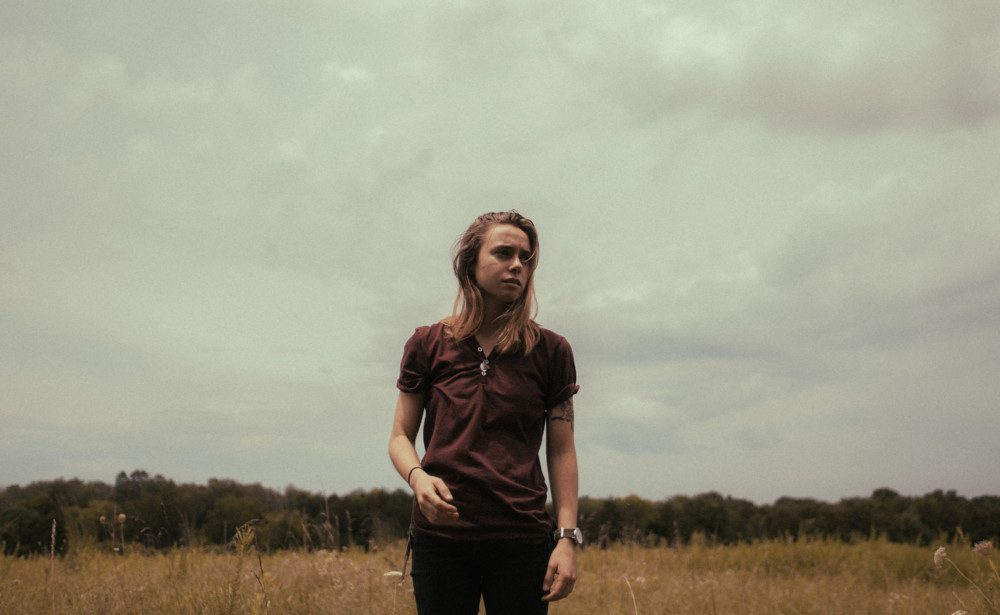ONLY NOISE: Finding A New Gospel in Unlikely Hymns


ONLY NOISE explores music fandom with poignant personal essays that examine the ways we’re shaped by our chosen soundtrack. This week, Tamara Mesko reckons with her evangelical upbringing via songs by Julien Baker, Kevin Devine, and David Bazan.
As a child, my world was mostly black and white, consisting of lists of rules to follow and religious rituals to submit to within the evangelical church. The litany of required observances included maintaining a modest dress code, attending church at least twice a week, attending Christian school with weekly chapel services, refraining from shopping on Sundays, and submitting to the ultimate authority of the pastor. This sheltered community of my family, church friends, and school friends was the entirety of my world throughout my childhood. Though some people thrive within structured, controlled systems, I was a sensitive, emotional child, drawn to the mystical areas of life, and longed for more freedom. The high point of my week was always the musical part of church services, and I felt a deep transcendence while I was singing with the congregation.
This subculture’s rigid list of restrictions also extended to my music-listening allowances outside of church. My album choices came from a finite list: songs we sang in church, songs played on the religious radio station, or CDs from the Christian bookstore. On the rare day that our family trekked to the mall, I’d immediately hone in on the music section of the bookstore, joyously scanning the stacks of new cassettes and CDs. This was one of the few places where I felt at home. I was longing for a connection with songs that weren’t listing rules, but rather showcasing love and compassion for all types of people and perspectives. I was searching for musicians who could expand my limited worldview, and hoping they could save me from my restriction-heavy life.
The Beginning
let go of what you know, and honor what exists
daughter, that’s what bearing witness is
Through the end of my teenage years, most of the music I heard was written for churchgoers, save for a few Nirvana songs I’d secretly record off the radio. Finally, in the late ‘90s, after years of searching for more musical substance, right there in my beloved bookstore, I discovered a band called Pedro The Lion. Led by David Bazan, who was also raised in the evangelical subculture, this band was decidedly different than any I’d heard before: though their music had a religious angle, it was made by people with incredible talent, with true care for their listeners, and with brutal honesty in their lyrics. I bought the Whole EP and It’s Hard To Find A Friend CD at the same time, and immediately became obsessed with both albums. The subversiveness of the lyrics astounded me; they were part of this subculture and yet singing about controversial topics? They were calling out hypocrisy in the church instead of focusing on formulaic, pre-approved storylines? I quickly internalized their crystalline lyrics: “Your horse is ready to ride / when morning comes / from this church town / where damning rumors drip from holy tongues.” Or Bazan’s detail of the particular coldness of a routine church service: “But if all that’s left is duty / I’m falling on my sword / at least then I would not serve / an unseen distant lord.” My heart and mind were jolted out of complacency, little inklings forming into an eventual blooming deconstruction of the religion of my youth.
Many years later, I eagerly awaited Bazan’s first solo album, Curse Your Branches, marketed as “a break-up letter to God.” Amidst an existential and spiritual crisis of my own, I intimately identified with all of the questions and accusations laced throughout these songs. The comfort I felt from his words soon turned to hurt as I heard the majority of my religious friends write him off as a lost soul or a heretic. I realized they’d only listened to Bazan as long as he’d kept his proclamations safe within the evangelical worldview, and as soon as he began to grow outside of that label, they seemed to lose trust that he could still benefit them.
One of the healthiest ideas I learned from those in authority over me was the power of discernment. I was taught to consider the source of any truth I was ascribing to, and, if I felt there were harmful messages in it, to not be afraid to question and expose this harm. Yet as I began to share how Bazan’s discerning lyrics helped me reconsider what it really meant to have faith in God, I felt rejected and unwelcome in my community. I wasn’t sure yet if I agreed with his ideas – I just wanted space to discuss them and to articulate my own questions. Although I felt dismissed, I found great courage in Bazan’s example of vulnerable honesty, and knowing I was not alone gave me peace through this anxious time. Bazan has always been a prophetic voice for me, and he continues to challenge me to consider the countless ways my daily actions belie what I say I believe. The transparent way he persists in bearing witness to his experience provides such solace and inspires hope that I may also be able to find a clear, truthful path forward.
Leaving
give yourself a breath
while you’re working it out
the answer’s in between
all the concrete and clouds
it’s anywhere you want
yeah, it’s next to you now
It was an extremely difficult step to start to define myself separate from the entire community I’d grown up in, to enter the scary unknown outside the previously clear, safe waters that now appeared murky and troubling to me. While I was immersed in this process, another musician, Kevin Devine, was beneficial in presenting an alternative perspective. Though all of his albums are incredible works of art, the one that strongly impacted my spiritual development was 2011’s Between The Concrete & Clouds. The title track traces the journey of his formative years, from Catholicism to atheism to existentialism to a mature, nuanced, slightly more solid ground that validates and gives grace to fellow questioners. The entire album pursues a resolution to elevate love and compassion to a first priority in all relationships, and in doing so it exemplifies a genuine Christ-like viewpoint.
Devine constantly examines how he enacts his belief system in real life, reflecting on both the consequences and the rewards of those actions. He’s shown me that I don’t have to ascribe to a religious tenet in order to be a moral, ethical, conscientious person in the world. On this album, his songs challenge me to break a cycle of default thinking, of cynicism, of obsessing about the past, and to instead process the past in a step toward redemption: “Leave ‘10 years ago’ 10 years ago / get back within yourself and listen close.” He places the burden of responsibility on each individual person, and motivates me to leave my comfort zone and consider spiritual, moral, and political viewpoints vastly different from my own. I’ve learned that it’s okay to disagree with those in authority who taught me discernment, and that my own perspective, intuition, and experience is valid and can be trusted. Listening to this revolutionary album, I’m led to reexamine the traditions I was taught, confront areas of cognitive dissonance, and move forward into a more holistic place where I’ve found an authentic path to love myself and to love others.
The Present
I think there’s a God
and He hears either way
when I rejoice
and complain
As I contemplated where I fit into modern religious spaces, often feeling out of place with both the evangelical and more progressive communities, I discovered another musician who solidified a specific, helpful foundation for me. This powerhouse of a writer and singer, Julien Baker, identifies herself as someone who believes in God, but weaves this belief throughout her life in nuanced, open-minded ways that strengthen my resolve to build up my own personal belief system. I so strongly identified with the emotions she expresses on her first album, Sprained Ankle, that I listened to it at least twice a day, every day, for an entire year.
Baker has an enduring, monumental power that she wields with such deliberate love. She makes all types of people feel welcome, even as she’s expressing her frustration with God in beautiful stanzas: “So I wrote you love letters / and sung them in my house / and all around the South / the broken strings and amplifiers / scream with holy noise / and hope to draw you out.” I can hear that she’s a seeker of truth, and she compels me to honestly profess what my current level of faith looks like, even if I continue to feel misunderstood by other people of faith. On this album she dives deep into themes of addiction, death, abandonment, and self-worth. There are no simple answers; life is complex, so it follows that religion cannot be reduced to a few statements. Belief systems must be given hands and feet and lived out, not in fear of, but in communion with other people. I know that as I continue to define my religious identity, Baker and her music will be there for me, to shake me out of complacency and point me toward a mystical spirituality and stability that has love and grace at its core.
Today, the black and white strictures of my childhood have blurred to gray, an evolving swirl of uncertain waters. But these three musicians have provided me a life raft, a sense of calm about setting adrift on my own spiritual journey. My system of morality is now primarily based on loving everyone and celebrating the spiritual connection that all of humanity shares. I try to use my many forms of privilege to advocate for those with less, and – a much harder task – try to have compassion for those with more. Religion doesn’t have to be organized, but I am currently part of a church community where I feel at home, in large part because of the music. Singing together with people who have also, at times, interrogated their faith is still deeply transformative for me, whether that’s in a church service or at a concert. When I think of the importance of these voices, I can’t help but be infinitely grateful for all of the beauty David Bazan, Kevin Devine, and Julien Baker provided as my belief system evolved, pointing me toward a more holistic truth with their unlikely hymns.

